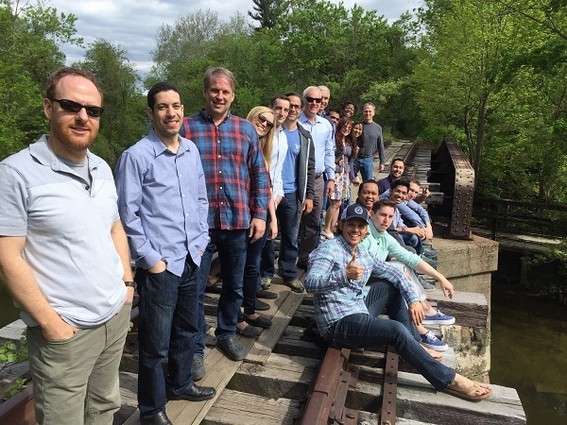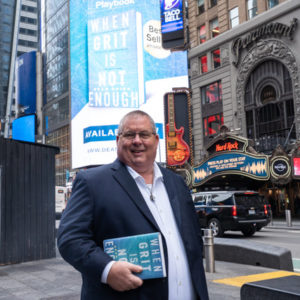Lambertville-based Startup RobustWealth is More Than Just Another Robo-Adviser

RobustWealth (Lambertville), founded by Mike Kerins in 2015, is a venture-backed startup in the financial space. The company produces a private-label robo-adviser product that enables other firms to offer financial advice digitally, using their own investment models, whether they are a large insurance company or a small registered investment adviser. RobustWealth recently announced that it was partnering with another financial tech company, Apex Clearing (Dallas). The partnership will give RobustWealth’s clients the ability to trade ETFs, mutual funds and U.S. stocks, all included in the platform fee, as well as a rapid client onboarding experience, account linking, same-day funding and easy bank transfers, the company said. We interviewed Kerins, asking what makes his company different from all the rest.
NJTW: What do you do better than other companies like you?
Kerins: The way we rebalance trades is more efficient than it currently is for consumers. We put a lot of thought into how we rebalance across accounts and how we trade. A lot of that comes from my background in investing. Also, our chief investment officer ran proprietary trading at a major bank. He was also on the board of Archipelago [Amherst, Mass.], so a lot of his thought process went into how we trade. We believe we are trading more intelligently than our competitors.
For the B2B market, we enable large and small firms to segment their client base using our digital advice solution so they can have smaller clients on a more automated platform. Then, as clients have more complex needs, they can use our software paired with a financial adviser. I call it the “robo-cop” model, part robot, part computer, part human. I think larger clients really need a financial adviser because there are complex situations that come up as their networks increase. So, we built our software to do both: pure automation for the smaller client segment, under $500,000, and adviser-assisted advice in the $500,000-plus segment.
NJTW: Tell us about your development effort.
Kerins: We do all in-house development, and 90 percent is done here in Lambertville. If you look at the way we work, first we come up with an idea that could be driven by a client or the management team. Then that product idea goes to product management, which is located in Lambertville. They spec it up, work through it, test the idea, take it to clients and see what they think about it. If it passes that test, it goes to a development team, also in Lambertville. Over 50 percent of our team members are developers. The dev team creates the product, and we test it. If it passes testing, which is also done in Lambertville, it goes into production, and clients can start using it.
NJTW: How many people are working at RobustWealth?
Kerins: We are growing. Right now we have about 25 people, two in California and one in Denver. We are trying to hire a few more operations-and-sales team members in Denver.
NJTW: How does your sales process work?
Kerins: Since digital financial advice is a hot topic, we have a lot of companies coming to us. We are in a unique spot since we private-label. In general, we get leads coming in and we work with the companies to see if we are a fit. It is a very consultative discussion on how the software fits in, how it needs to be customized to their current needs; and then we launch it. After the launch, we do training and consulting work with them. It’s similar to a Salesforce sale. It’s not just about coming in and signing up. It’s about, “How does this fit with your current business and improve what you currently do? How can we implement it in your business?”
NJTW: We know that RobustWealth is venture-backed. Can you talk about your process for obtaining venture capital?
Kerins: We are backed by Walden Venture Capital (San Francisco). They are great! We have a great relationship with them. Going from bootstrapping to taking venture capital has been a great process for us. We work with Larry Marcus there; and he acts as a consultant, guiding the company to success. John Horvath, from Horvath & Giacin (Pennington), is also on our board, and I couldn’t have done it without him. We have excellent board meetings, and I am fortunate to have such great partners in the business.
The process of finding venture capital can only be described as painful and time-consuming. Finding the right fit from a partner point of view, someone who understands what you are trying to do and who understands the opportunity for an early-stage company, is hard. You have to go to a lot of meetings to find the firm that understands what you want to accomplish, and is willing to support you and be a good partner. It’s not just who will give you money. It’s who will be a good partner in the long run.
NJTW: Why are you in New Jersey?
Kerins: I went to school in Boulder, Colorado, and I chose Lambertville for my business. It’s in New Jersey, but it’s as close as you can get to a Colorado mentality here. I went to high school just across the bridge, at Council Rock. My wife, kids and I live in Lambertville, as well as other members of my family. When looking for a home for the business, it just made sense to start it right in the town where I live. The town has welcomed us with open arms, and many of our employees also live within walking distance of the office.
NJTW: What do you think of New Jersey as a place to found a startup?
Kerins: I love New Jersey, grew up going to the Jersey Shore, was born in New Jersey and now live in New Jersey. We completed our seed round while in New Jersey. The East Coast is always a more difficult spot to raise capital, but Lambertville is an excellent spot to have a startup. It is centrally located between New York and Philadelphia, and is a under 20 miles from Princeton.
The East Coast could use a little more Bay Area influence, with the angel groups and VCs. It’s less about cash flow in the first few years, and more about the idea and disrupting. Both VCs and angel groups in New Jersey seem to be more focused on biotech and pharma, which makes sense given the heavy pharma concentration. That said, I think New Jersey is a great spot to seek funding and launch a startup. Towns like Lambertville and Asbury Park are ideal for New Jersey-based startups. Real estate is affordable. They are also close to New York and Philly, and there is a strong creative vibe in both.
One thing the state and universities could improve on is connecting me as a technology startup with the universities. I have really struggled to connect with universities in the region, to get someone in the career department who understood my needs and could feed me qualified hires. In contrast, I could email the career department at a quant finance program in California, and I would get the career department highly engaged, sending me applicants via email. It’s easy. No forms, no big process. If I do the same with New Jersey, they send me to the career department to post a job. It wasn’t interactive. I want to have a relationship with these university career departments. We are small. I get it. But we weren’t able to have that.
We have a big problem: We actually can’t find enough good developers. This is a general problem across the country. We relied on the H1B program, and have a good number of U.S. citizens as developers. We have several openings right now for developers. We’ve interviewed a lot of people for front-end and back-end positions, and we will end up having to open up an office in California because I can’t fill them. I can’t find candidates available in this area.
So, I think the state should improve how it enables tech startups and connects the startups to the universities that are pumping out qualified job candidates. That kind of ecosystem isn’t hard to build out and think through, but that’s where they could add a lot of value.
#####

